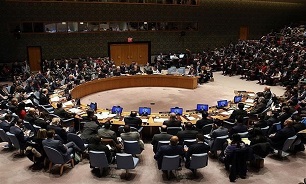Russia to Veto Western Bid to Condemn Iran at UN over Yemen
 The 15-member Security Council, instead of targeting Saudi Arabia for its continued massacre in Yemen, plans to renew its sanctions on Yemen on Monday.
The 15-member Security Council, instead of targeting Saudi Arabia for its continued massacre in Yemen, plans to renew its sanctions on Yemen on Monday.
Last week, Britain circulated a draft resolution that would renew sanctions on Yemen for another year and also “condemns” Iran for allegedly breaching the 2015 arms embargo on the country by "failing to take the necessary measures to prevent the direct or indirect supply, sale or transfer" of short-range ballistic missiles, UAVs and other military equipment to Yemen’s Houthi Ansarullah movement.
The draft resolution, backed by France and the US, calls for unspecified measures in response to the UN report about Iran’s alleged role in Yemen, stressing that the UNSC will take “additional measures to address these violations,” and that “any activity related to the use of ballistic missiles in Yemen” is a criterion for sanctions.
The United States has been lobbying for months for Iran to be held accountable at the United Nations, while at the same time threatening to quit a 2015 deal among world powers to curb Iran’s nuclear program if “disastrous flaws” are not “fixed”.
A UN Security Council resolution needs nine votes in favor and no vetoes by Russia, China, the United States, France or Britain to pass.
US Ambassador to the United Nations Nikki Haley took her Security Council colleagues to Washington in January to view pieces of missiles fired by the Houthis at Saudi Arabia in a bid to boost the US case against Iran.
Russian UN Ambassador Vassily Nebenzia said after the visit that he does not believe there is a case for United Nations action against Iran. Iran has described the arms displayed in Washington as “fabricated.”
Both Tehran and Sana’a have repeatedly rejected the allegations as a fabricated scenario and said the armed forces of Yemen have strengthened their missile power on their own.
Iran, along leading international human rights organizations, has called for an immediate end to the sales of arms by Washington, London and other Europeans to Saudi Arabia and other aggressors, who are killing innocent Yemeni people on a daily basis.
During his first trip to Saudi Arabia last year, US President Donald Trump signed a $110 billion arms deal with the Saudis, with options to sell up to $350 billion over a decade.
According to statistics by the UK’s Department for International Trade (DIT), Britain’s sales of military equipment to Saudi Arabia hit £1.1 billion in the first six months of 2017.
Yemen’s defenseless people have been under massive attacks by the coalition for almost three years but Riyadh has reached none of its objectives in Yemen so far.
Since March 2015, Saudi Arabia and some of its Arab allies have been carrying out deadly airstrikes against the Houthi Ansarullah movement in an attempt to restore power to fugitive former president Abd Rabbuh Mansour Hadi.
Over 14,000 Yemenis, including thousands of women and children, have lost their lives in the deadly military campaign.
